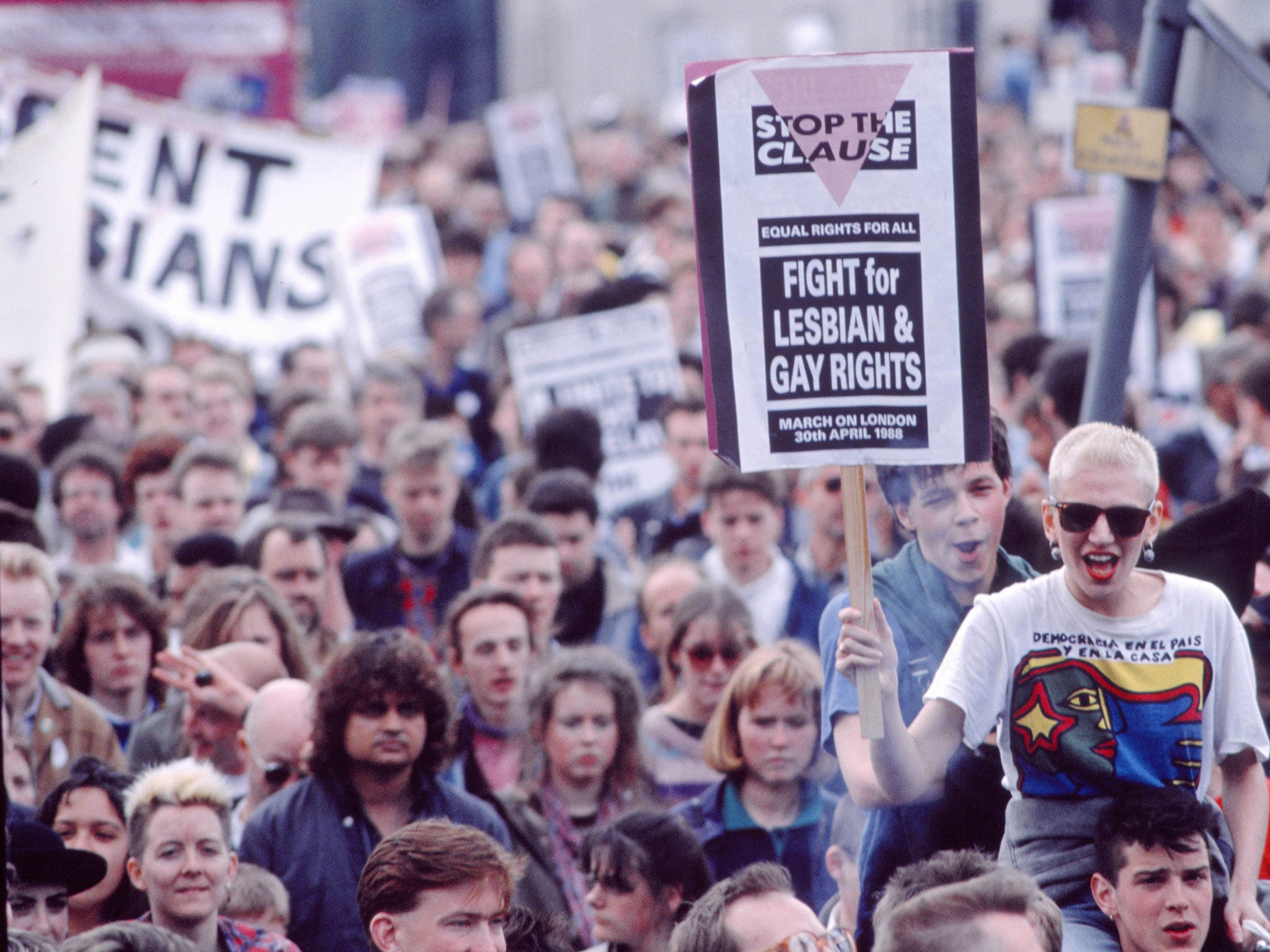Section 28 hurt the Tories more than young gay people
During the 15 years in which Section 28 was law, no local authority was prosecuted


Your support helps us to tell the story
From reproductive rights to climate change to Big Tech, The Independent is on the ground when the story is developing. Whether it's investigating the financials of Elon Musk's pro-Trump PAC or producing our latest documentary, 'The A Word', which shines a light on the American women fighting for reproductive rights, we know how important it is to parse out the facts from the messaging.
At such a critical moment in US history, we need reporters on the ground. Your donation allows us to keep sending journalists to speak to both sides of the story.
The Independent is trusted by Americans across the entire political spectrum. And unlike many other quality news outlets, we choose not to lock Americans out of our reporting and analysis with paywalls. We believe quality journalism should be available to everyone, paid for by those who can afford it.
Your support makes all the difference.It is debatable who was more damaged by the notorious Section 28 – young gays, or the Conservative Party. It is claimed that while it was in force it did lasting damage to adolescents trying to come to terms with their sexuality, because responsible adults were inhibited from telling them that homosexuality is a natural occurrence. That damage was invisible at the time and would be difficult to compute now. The self-inflicted damage to the Conservative Party was easy to see.
Where previous anti-gay laws criminalised sexual acts, Section 28 was ostensibly aimed not at gays but at left-wing councillors and council employees by making it an offence for a local authority to “intentionally promote homosexuality or publish material with the intention of promoting homosexuality” or to “promote the teaching in any maintained school the acceptability of homosexuality as a pretended family relationship”.
Its main sponsor was the Tory MP Jill Knight, now a 90-year-old Tory peer, who still claims that she was motivated by horror stories she heard from parents of pre-school children being shown explicit material explaining how gay sex is performed. Another source of inspiration for Section 28’s backers was Margaret Thatcher’s speech to the 1987 Conservative Party conference, in which she complained that children were being “cheated of a sound start in life” by teachers who taught them that they had “an inalienable right to be gay”.
Though the Conservatives may have thought that they were targeting left-wing ideologues with a political motive for undermining traditional family values, a very large number of gays saw Section 28 as a direct attack on their sexuality. Gay men had experienced several terrible years since the Aids epidemic arrived in the UK, but Section 28 acted like a stimulant that revived their fighting spirit.
On the day it became law, in May 1988, 10,000 people demonstrated in London and 15,000 in Manchester. The campaign drew celebrity support from rock stars, such as The Stone Roses, from the actors Ian McKellan and Michael Cashman, and from the ex-Tory MP Matthew Parris, and led to the creation of the organisation, Stonewall. Boy George, former lead singer of Culture Club, brought out a single entitled “No Section 28”.
It also inspired memorable protests, such as the occasion when three lesbians smuggled rope into the public gallery in the House of Commons and abseiled into the Chamber. Another group invaded the BBC studio in Shepherd’s Bush. Their muffled shouts and thumps could be heard in the background during the TV broadcast of the Six O’Clock News.
No local authority was prosecuted under Section 28 during the 15 years it was law, until Tony Blair’s government removed it from the statute books in 2003. So as an example of public policy, it was an abject failure that rebounded on its creators. However, gay rights activists warn against assuming that it did no harm. They say its impact was in the self-censorship that teachers and public employees exercised when talking to young people about sex, for fear of prosecution.
Section 28 gave the Conservative Party a lasting reputation as the anti-gay party, the party of sexual intolerance, for which David Cameron issued a public apology at a Gay Pride event in July 2009, saying: “I’m sorry for Section 28. We got it wrong.”
Join our commenting forum
Join thought-provoking conversations, follow other Independent readers and see their replies
Comments